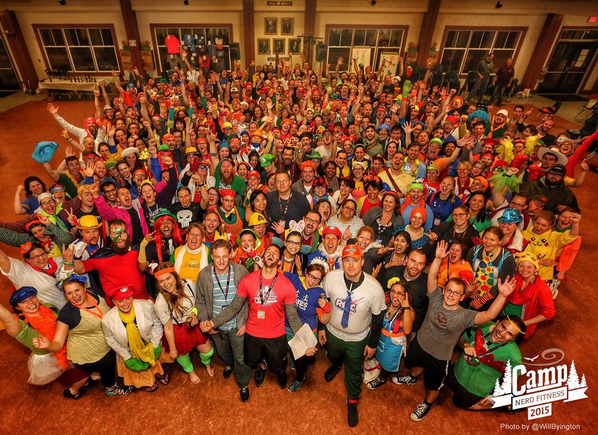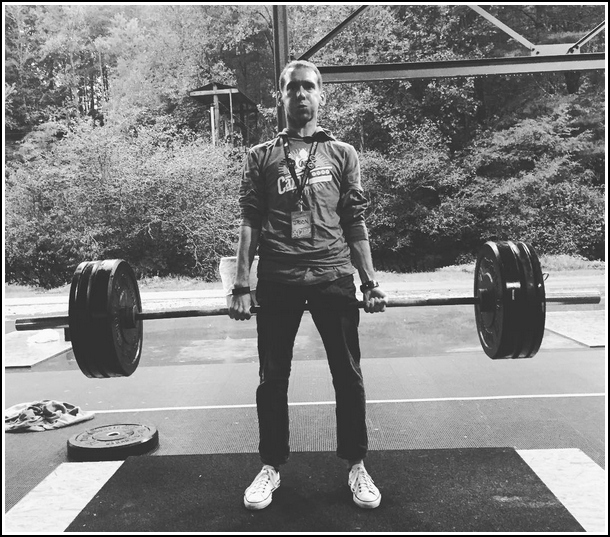Last week, I traveled to Camp Nerd Fitness for a long weekend of teaching classes, connecting with runners, and wearing women’s clothes:
A photo posted by Jason Fitzgerald (@jasonfitz1) on
No, I wasn’t cross-dressing for the thrill. We were at a Rubik’s Cube party where you switch clothes until you’re all one color.
Camp NF was the hybrid child of a conference, fitness camp for adults, and multiple theme parties – with plenty of nerdy activities like board games and Mario Kart.
Produced by the Nerd Fitness team, camp was an absolute blast that showed everyone it doesn’t matter where your fitness is or how good (or bad) shape you’re in right now. If you want to improve – or “level up” – you’re welcome.
And as you can see, there were people from all walks of life:

Beginners, young, old, all races and ethnicities, international campers, and even gymnasts and endurance athletes all joined together.
All anybody cared about was improvement and having fun. The atmosphere was something special and I’m very proud to be a small part of that experience.
The classes I taught were a blast:
- Beginner’s Running (with a group run)
- Injury Prevention & Running Form (with a form analysis)
- Obstacle Course Racing
- Programming (with my co-teachers Staci and Anthony)
- Advanced Running
We learned a lot. We had a lot of fun. And we all met new friends.
It was an incredible weekend – and today, I want to share the most important lessons I learned from nerding out for three days in the Georgia Mountains (it was so pretty!).
There are Beginners… and There Are REAL Beginners
I admit that the coaching material I publish here is mostly geared toward beginner to intermediate runners.
I’m not writing for Olympic athletes but I also don’t cater to someone who literally can’t run for a minute.
At camp, I met plenty of aspiring runners whose fitness was so low that running more than a minute at a time was impossible. They wondered if running would ever get easier, if they’d ever be able to run a 5k (without walking), or how long it would take to see progress.
It’s my fault that I don’t have much advice here for these runners. It just hasn’t been my focus.
Yes, I have a book just for beginners. But I assume that you’re able to run a little bit and you have a few months of running established.
But what if you don’t?
Talking to these campers made me realize that these are some of the most passionate runners there are! They’re truly excited about running and what their first race will feel like (hint: it’s awesome).
I’ll now be planning more material for these runners – those who are starting at ground zero and haven’t taken a single running step.
If I’m not helping regular people become runners, then I’m not doing my job.
So if you’re just starting or even thinking about starting to run, I encourage you to join the team. I’ll have a lot more resources just for you in the coming months.
Learning From Other Expert Athletes
I spent a long weekend around some incredible people who were capable of incredible things.
I was the runner and coach – and my Warrior Dash win and 2:39 marathon best definitely made some campers incredulous.
But there’s also Anthony, who deadlifted 555 pounds at camp – making it look easy. My mind is still reeling thinking about it.
Or Jim, who can walk on his hands better than I walk on my legs. Oh, and he can do a one-arm handstand.
Let’s not forget the other incredibly athletic skills I saw, like parkour, tricking, and sword fighting. Yes, sword fighting!
We’ve always known that to be a good runner, you must also be a good athlete. Moving well – efficiently, strongly, and gracefully – through every plane of motion has some serious benefits:
- Less wasted movement
- Fewer inefficiencies
- More conserved energy
- Fewer running injuries
- Faster race times
Not a bad list of benefits!
Going to camp and meeting these incredible athletes and learning their perspectives on fitness was invaluable to me as a coach.
It’s given me a lot to think about and I know it will have an impact on the workouts, strength routines, and programming that I assign my athletes.
“Strength Enables Everything”

Runners need to be strong. We’ve known this – and I’ve talked about strength workouts for years – but just how strong?
While runners should always prioritize running first, there is a place for powerlifting exercises like squats and deadlifts. If you can increase the amount you can lift, there’s no doubt you’ll be a faster runner.
The benefits of lifting heavy are undeniable:
- Produce more force when you run (by contracting more muscle fibers, you essentially push off the ground with more strength)
- Run more efficiently (with an enhanced ability to contract more muscle fibers, you can use less of them when you’re fresh and more of them when you’re tired)
Those two benefits alone will give you enormous results.
After setting a new deadlift PR of 205 pounds (I know, I’m not that strong… but I am only 125 pounds!), I’m excited to dive into these exercises in more detail soon.
But more than simply saying “you should do squats” or explaining how to do a squat properly, I want to help you with incorporating heavier weightlifting into your training.
On what days should you lift heavy?
How many reps and sets of deadlifts are recommended?
Should runners lift heavy for their upper body as well?
What does an entire powerlifting workout look like – from warm-up to peak effort to cool-down?
When during the training season is it recommended to lift heavy?
What runners should lift weights – beginners, advanced, or everyone?
I don’t have answers to all of these questions. And I don’t have the best answers for some of them.
But soon, I will. And I think it’s going to be a big turning point in how we train and how well we run races.
Looking to the Future
Camp Nerd Fitness was incredible. I’m very fortunate to have been asked to be an instructor (being a camp for nerds, all the trainers were called Headmasters) and participate in a weekend of learning, discovery, friendship, and community.
If you’re interested in attending next year, learn more about camp here.
Steve Kamb is the Rebel Leader of Nerd Fitness and I’ve known him personally since 2011. We met in DC, he bought me a beer and encouraged me to keep working on Strength Running when the blog was 35 times smaller (no exaggeration) than what it is today.
Later he stayed at my house while traveling through the city and asked me to coauthor his Rebel Running Guide for new runners.
As I’ve watched Nerd Fitness grow, I’m more and more impressed with its community: the quarter of a million nerds who stand together as one to level up their lives.
It’s not that common today for so many people to unite and band together to learn, laugh, and be themselves. Steve has fostered a wonderful community and I’m honored to be a part of it.
His example has also encouraged me to do the same. I’ve admittedly not done the best job of bringing fellow Strength Runners together – I’m too focused on your running results most of the time!
But that’s going to change over the coming months.
We have something special here: a growing group of runners who know that we can all be better runners.
We can run faster.
We can prevent injuries.
We can be more consistent.
And we can have a lot more fun doing it.
As I talk to runners of all abilities who read Strength Running, there’s a common message I hear over and over again: Strength Running gave me hope that I can be a better runner.
No, injuries don’t have to be so common.
No, performance plateaus aren’t permanent.
And no, you don’t need to spend five hours every day on your training.
Helping so many of you – literally tens of thousands of runners – over the years gives me more satisfaction than you can imagine.
But we can do better.
No doubt that it’s an exciting time to be a member of the SR family.
And if you’re not yet on the team, I invite you to join us today.
There are so many fun projects coming up and I’m beyond excited to share everything with you.
Run strong!
– Jason.